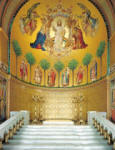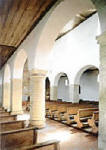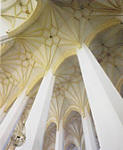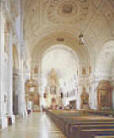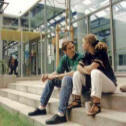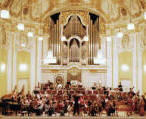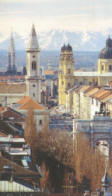CSB/SJU German
Section - In the News!
Newsletter of the German Section of the
Department of Modern and Classical Languages
![]()
![]()
![]() Spring 2005
Spring 2005
See also:
Freshman Year Trip to Vienna, Salzburg, and Munich!
Fall Semester in Salzburg!
Fall 2005
Newsletter
Spring
2006 Newsletter
Spring 2007 Newsletter
Contact us by Email
Sam Boggs
Wins Summer Grant for His Research on
German Poetry on War and Peace
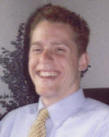
SJU junior Sam Boggs received notice in April that he has been one of five honors students to receive a $4,600 grant for on-campus summer research. Sam's plan for the ten-week research period is to read and analyze approximately 200-300 German poems from various literary epochs dealing with the topic of War and Peace. Sam plans to present his honors thesis at the Notre Dame Peace Studies Conference at the end of March 2006. This conference is intended for both graduate and undergraduate research presentations. He may also present his research at the American Association of Teachers of German convention in November 2005. Sam will also give presentations about his research in German classes; at his German senior project presentation (conducted entirely in German) in Spring 2006; and at his honors thesis defense in Spring 2006.
![]()
![]()
![]()
Chris Schumacher, Kim Skramstad, Sarah Miller and John Kamman Win Fulbright Teaching Assistantships in Austria Starting This Fall

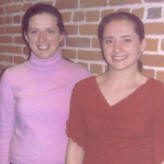 |
Aaron Voth
and Danielle Simpson Named Alternates Each year, CSB and SJU
German majors and minors are selected for teaching positions in
Austrian Gymnasien, or schools. Over the past 15
years about 40 CSB/SJU students have participated in this
prestigious international program following their graduation.
The Fulbright Program especially appreciates applicants who
are interested in incorporating the study and use of German in
their plans for the future -- either in teaching or in other
careers. For more information about how to apply before next year's
February 1 deadline, see the Fulbright webpage: http://www.fulbright.at/us_citizens/teaching_intro.php Photos to the left are of Fulbright winners Chris Schumacher, Kim Skramstad and Sarah Miller.
|
|
 |
|
|
Greta
Sandnas and Jessica Argabright win
S. Margaretta Nathe Scholarships totaling
$2000
Greta and Jessica pictured here.
|

|

More than $25,000 Raised for the Otmar Drekonja German Cultural Studies Scholarship Fund
|
Scholarships Will Benefit Promising Students Seeking
Undergrad Degrees in German Studies Saint John's President Dietrich Reinhart, OSB, the Mayor of Saint Cloud, the Minnesota State Senate and Minnesota's Governor Tim Pawlenty all came forward to recognize Professor Emeritus Otmar Drekonja for his many contributions as German Professor at CSB/SJU, including directing more than 15 groups to central Europe and founding our current program at the University of Salzburg in 1977. Otmar, your career has been stellar in every respect, and generations of students will continue to benefit from your visionary spirit -- both in our department and abroad programs. Your performance of the opening monologue of Goethes Faust at our recent cabaret was magnificent! How can we ever thank you adequately for the inspiration, positive spirit, hard work and sheer breadth of imagination you brought to the department? May this scholarship in your name help inspire us to teach and lead with the same kinds of energies you demonstrated throughout the many years of your career! |
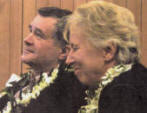 Otmar and Ingrid Drekonja. Ingrid also taught German for us for 17 years. |
![]()
![]()
![]()
German Faculty Awarded $2500 for Summer Curriculum Development
We'll be working for you this summer! German Professors Andreas Kiryakakis, Lisa Ohm, Wendy Sterba, John Kulas and Mark Thamert will be in workshops together this summer to carry out the activities of their grant proposal, Excellence and Coherence in the German Curriculum. The grant was awarded by Provost Henry Smorynski on behalf of the CSB/SJU Faculty Curriculum and Program Development Committee.
![]()
![]()
![]()
Keith Spinali Takes History Course Under the New German Option with History Professor Gregory Schroeder
 Keith Spinali |
This coming fall SJU junior Keith Spinali and professors Gregory Schroeder and Mark Thamert will be piloting the German Option, a new program under which a student can take a course in departments like History, Philosophy, Economics, Psychology or Music and have the course count toward the German major. The course must treat some aspect of German history, culture, literature or social thought. Before the course starts, the student simply contracts with the professor of the course along with a German professor to do significant readings and writings in German on topics related to the course. It may also include a final oral presentation and conversation in German with the two professors. |
![]()
![]()
![]()
German Students and Professor Lisa Ohm Visit Twin Cities Mosque
| Recently Professor Lisa Ohm and her students visited a mosque in the Twin Cities after reading about the Moslem Turkish community in Germany. Students were treated to a full-fledged tour in German and were invited to attend the evening prayer service. Their host was born in Turkey but lived in Germany for 25 years and is employed by Siemens. He has been in Minnesota for six years and was delighted to be speaking German once again. Pictured to the left is Professor Lisa Ohm. |
 |
![]()
![]()
![]()
Thoralf Knoll from East Berlin Heads to Maxwell School for International Relations at Syracuse University for Grad Studies
 |
Thoralf
will miss Saint John's and Saint Ben's. When
asked to say something about his experience as an
international student here, Thoralf said,
|
![]()
![]()
![]()
| Kate Hartmann
Signs Up for Work-Study in Berlin Starting this fall, Kate will be fully immersed in German language and culture as she works in a healing center called Weg der Mitte in a former monastery in Berlin. We are proud of your initiative, Kate -- and good luck! We hope to hear from you. |

|
![]()
![]()
![]()
German Majors Complete Senior Presentations
Eine Untersuchung von
weiblichen Geschlechtsrollen in den Kinder- und Hausmärchen der
Gebrüder Grimm.
Kate L. Hartmann.
The Grimm Brothers’ Children’s and Household Tales are a hallmark of
German history which provide a place for an oral tradition of
stories to be recognized and remembered. First published in December
of 1812, the stories gained instant popularity, being the most read
book in Germany, second to the bible. I have chosen to
concentrate on female gender roles in the stories, particularly
those dealing with the values of beauty, passivity, and purity.
Märchen.
Sarah A. Miller There are six monolithic theories used to
define fairy tales: 1) all fairy tales are nature fairy tales 2)
fairy tales are etiological 3) fairy tales as Charters 4)
Structuralism 5) Psychological theories involving Freud and Jung and
6) Ritual theory of fairy tales. Throughout this paper I will
explore the different ways to interpret fairy tales. Then I will use
a Jungian approach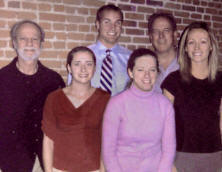 created by Maria Louise von Franz with seven distinct steps to
interpret The Little Red Riding Hood.
created by Maria Louise von Franz with seven distinct steps to
interpret The Little Red Riding Hood.
Pictured here: Professor Andreas Kiryaykakis and his
advisees, Sarah Miller, Kim Skramstad, Kate Hartmann -- and in
the back, Will Rogers and Pater Mark Thamert. Professor
Kiryakakis is head of the German section.
Der Stress des Westens.
William Rogers. The Western world has long been the leading force
in modern medicine and technology, but even with all advances in
scientific research, individuals from Western societies seem to be
on the decline emotionally and ethically.
Buddhist and Jungian thought allow individuals to examine their
world from a totally different perspective, opening new
possibilities to affective coping strategies. All forms of religions can be used as a way of coping
with psychological issues, but it is the duty of the every human
being to find a method that suits them best, or to find an alternate
method if religion doesn’t fit into one’s scope.
Märchen: der Wert für Kinder.
Kimberly Skramstad. Fairy Tales have been told and accumulated through many different
lands, and through many different centuries. Two of the most famous
collectors of fairy tales are Charles Perrault and the Brothers
Grimm. Although both of these collections are beautifully written,
the Brothers Grimm “Kinder und Hausmärchen” are psychologically more
important. The Grimm fairy tales have many obvious and hidden morals
and messages that help children grow into stable young adults.
![]()
![]()
![]()
German-Management Major Brian Schnese Featured in
Spring 2005 CSB/SJU Magazine
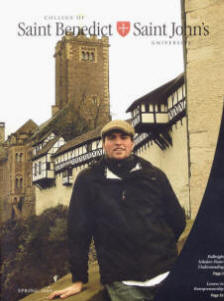 |
A few
months ago Brian applied for both the Austrian and German
Fulbright Scholarships -- and won both! Since
September Brian has been living in Luckau, 80 km. south of
Berlin.
At the beginning of his year-long experience in Germany, Brian said,
|
Editor's Note: Included here is Brian's letter for all students thinking about taking more German (and becoming a minor or major!) -- Brian states emphatically that college students simply must become fluent in a second language in order to broaden their range of opportunities in the future -- no matter what career choices you might make. We simply need to know other cultures from the inside.
Liebe CSB und SJU Freunde!
Es ist nur drei Jahre her, wo ich mich gefragt habe: Was kann
ich eigentlich mit einem Deutsch-Diplom tun? Wieso brauche ich so
etwas? Lasst mich eben nur ein bisschen erzählen, was ich gerade
mache. Zurzeit bin ich Fremdsprachen-Assistent in Deutschland. Ich
wohne in Luckau, in d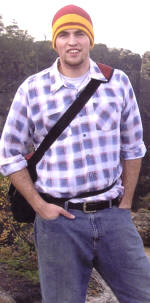 er
Nähe von Berlin, in einer ehemaligen Kirche und arbeite mit Schülern
aus den 7. bis 10. Klassen. Jeden Tag fahre ich mit meinem Fahrrad
durch die Stadt zur Schule. Und jeden Tag werde ich glücklich
überrascht. Die Gebäude sind alle aus der 18. Jahrhundert und sehen
wunderschön aus. Wie ein Märchen!
er
Nähe von Berlin, in einer ehemaligen Kirche und arbeite mit Schülern
aus den 7. bis 10. Klassen. Jeden Tag fahre ich mit meinem Fahrrad
durch die Stadt zur Schule. Und jeden Tag werde ich glücklich
überrascht. Die Gebäude sind alle aus der 18. Jahrhundert und sehen
wunderschön aus. Wie ein Märchen!
Wir haben noch eine unzerstörte Stadtmauer und Stadtgraben. Und die
Leute... die Leute freuen sich jeden Tag mich wieder zu sehen!
Hallo Brian! Guten morgen Brian! Jeden Tag lerne ich jemand neu
kennen. Jeden Tag erfahre ich was Neues über diese Kultur und diese
Leute. Als ich noch an der Uni war, habe ich gesagt: Nachher will
ich was Großartiges machen. Ich will mit Leuten arbeiten. Ich will
ein Abenteuer! Und das mache ich jetzt.
Ich bin der einzige Amerikaner in einer Stadt von 5000 Leute
und bin in Prinzip ein Botschafter für die Vereinigten Staaten. Ich
habe jeden Tag die Möglichkeit, die Beziehungen zwischen Deutschland
und den USA positiv zu unterstützen.
Ich würde es Euch empfehlen! Wenn ihr die Möglichkeit habt
ein Auslands-Semester zu machen - tut es! Nehmt doch Deutsch als
Haupt- oder Nebenfach. Heutzutage, egal was du beruflich machen
willst, musst du eine zweite Sprach haben und eine Menge von
verschiedenen Erfahrungen haben. Diese Welt wird kleiner und das
heißt, man braucht eine bessere Idee von anderen Kulturen zu haben.
Bereitet Euch auf die Welt vor! Inzwischen wünsche ich Euch
Viel Glück und Erfolg!
Mit freundlichen Grüssen,
Brian Schnese
Brian, You and all our other Fulbright winners do us proud!
Thank you for your fine example of scholarship and initiative!
![]()
![]()
![]()
On April 18, students of the German Section and members
of the German Club hosted their first Cabaret evening at the Prep Weber
Center. The evening featured an authentic Austrian puppet-play version
of Erlkönig and Scenes from Goethe's Faust (Ingrid
Drekonja made the puppets for us!); The George Maurer- Jeff Engholm Jazz
Duo performing Rainer Maria Rilke Poems; Professor Emeritus Otmar
Drekonja reciting the opening monolog of Faust by heart; Fr. Bob
Koopmann leading us in Willkommen, Bienvenue song from the show,
Cabaret! – and improvisations on Schubert's Erlkönig; favorite
poems recited and sung by heart by upper-division German students;
several other wonderful acts, and finally authentic Apfelstrudel,
Sachertorte and other Leckerbissen in the style of a Vienna
Café. Welch schöne Erinnerungen! Pictured here are only some of the
participants
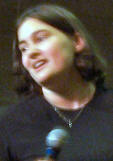

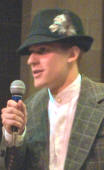

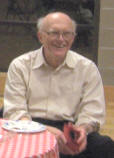
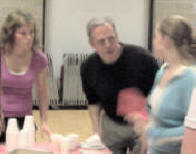


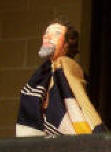
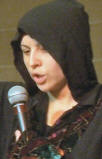






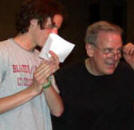
Herzlichen Dank an alle, die mitgemacht haben!
![]()
![]()
![]()
45
CSB/SJU Students Head to Munich for May Term
This is the third summer in the row that students of our colleges have had the chance to experience Germany, Austria, Switzerland, and Italy first hand. The first May Term -- one of the first in our colleges' history -- was offered two years ago for 30 students and featured a comparison of the art and architecture of Berlin and Munich. Last year 45 students participated in a similar May term, but the topic shifted to the development of German Romanesque, Gothic, Renaissance and Baroque art and architecture in relation to what was happening culturally in the Mediterranean region. This summer on May 10 and again on July 13, a total of forty-five more students will depart for the summer term seminars titled, Rome, Florence and Munich: Arts and Ideas.
Pictured here: Students biking through Munich learning about the history of its architecture and the intellectual movements that gave rise to radically different kinds of architectural expression. In the picture on the right, Sam Pokorney (center) joins Bavarian Schuhplattler in a traditional Volkstanz.

|
In order starting at the top left: Thron- und Sängersaal Neuschwannstein, Petersberg Kirche bei Eisenhofen, Frauenkirche München, Petersdom in Rom, Kirche Sankt Michael und Asamkirche in München |
|
![]()
![]()
![]()
Twenty CSB/SJU Students on Their Way to the University of Salzburg for a Four-Month Fall Term
Changes in the Salzburg Program Feature Increased Language and Cultural Immersion
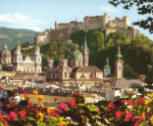
|
| This year's group includes Jessica Argabright, John Benson, Mark Bublitz, Corey Busch, Colt Edin, Ryan Fader, Suzanne Goossens, Erik Hendrickson, Mary Holly, Catherine Krause, David Lambert, Sam Lauer, Andrew Meyer, Michael Risch-Janson, Dan Schumacher, Mersi Seferovic, Bryan Short, Aaron Smiles, Ted Welle, and Laura Wunsch. Students are already gearing up for fall term by completing a series of German conversation and advanced grammar exercises focusing on increasing their readiness to take the plunge once they are in Salzburg. This year instead of one of their four classes being in German and the rest in English, all of their classes will gradually be taught completely in German. More advanced students will act as tutors and guides for those with less preparation. In addition, students will take a new Austria Immersion course designed to provide opportunities for students to become more integrated with native Austrian families and students their age. Zukunftige Salzburger, we wish you the best! Check out the Salzburg Website. |
![]()
![]()
![]()
Take a German Immersion Course This Summer!
Record numbers of college students are deciding to take immersion courses in German during the summer months. Courses last from one week to several weeks. This is an invigorating way to spring forward in your language fluency, either stateside or in Germany or Austria. Check out just a few of the best possibilities here.
![]()
![]()
![]()
|
|
Can you identify the kinds
of architecture there are in just this one picture of Munich? Neo-Classical Neo-Romanesque Neo-Gothic Baroque By the way, the Ludwigskirche -- the church pictured in the foreground with the white spire -- was built by the same King Ludwig whose generosity helped found Saint John's and Saint Ben's! Did you know that Saint John's first name was Ludwig-am-See, named after this King Ludwig I of Bavaria? |
![]()
![]()
![]()
Do you have comments or news for upcoming editions of In the News? Feel free to e-mail us at German section news!
See also: Fall 2005 Newsletter


